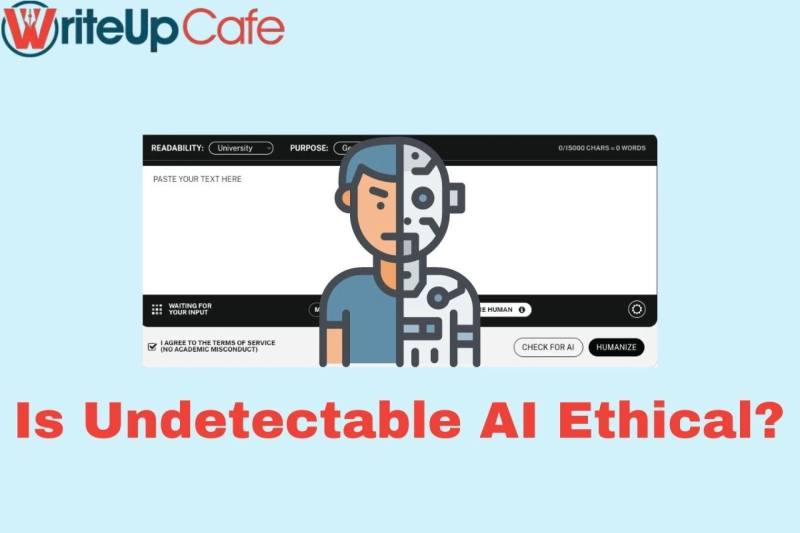Undetectable.ai, a unique AI detection software, offers a twist. It not only detects AI-generated content but also has the ability to rewrite and modify it, making it undetectable by other AI content detection systems.
Developed by Bars Juhasz, a Ph.D. student at Loughborough University, Undetectable.ai was launched in May 2023 and has since sparked debate and concern among researchers and academics.
Examining Undetectable AI
The core issue with a tool like Undetectable.ai is that it enables people to pass off AI-generated content as authentic human writing. This has problematic implications in academic, professional, and online contexts.
Theoretically, Undetectable.ai could be misused to facilitate plagiarism by students, undermine the credibility of online information, and generally make it harder to discern fake content from genuine human-authored writing.
The Ethical Side
On a positive note, Undetectable.ai, despite its controversial nature, ironically features one of the most robust and accurate AI detection systems, as acknowledged by several sources, including Forbes.com. Moreover, it's entirely free to use, potentially democratizing access to AI detection technology.
Another honorable thing Undetectable does is provide disclosures and warnings about not allowing people to cheat when using the software.
The other notable point, is that while Undetectable.ai is the most popular, and well-known software in its category, other applications are aimed at bypassing AI detectors such as aidetectionbypass.com
Research Behind Undetectable AI
Several academic studies have demonstrated Undetectable.ai's effectiveness at circumventing AI detection. A July 2023 paper by Andrea Taloni et al. from Magna Græcia University found that while AI detectors were 95% accurate at identifying AI-generated scientific text, the accuracy dropped significantly when the same text was “humanized” by using Undetectable.ai.
Concerns
Concerns have also been raised about Undetectable.ai's potential to compromise the integrity of data gathered from online questionnaires and studies. On August 2023, a paper by Christoph Bartneck et al. found that AI detectors failed to flag survey responses generated by AI and obfuscated using Undetectable.ai, which could skew results.
On another level that raises ethical concerns, tools like Undetectable.ai are troubling because they are arguably designed to deceive. In a November 2023 paper, Erik Piller from Nicholls State University questioned the moral foundations and intentions behind Undetectable.ai, expressing skepticism that it could have positive applications.
Ultimately, the rise of Undetectable.ai and similar "adversarial" tools points to a cat-and-mouse game between AI-generated content and AI detection—one that could make it increasingly difficult to separate truth from fiction online.
The Counter Argument
The counterargument is that a tool like Undetectable.ai is inherently neutral, and it's up to the user to apply it ethically or unethically. This underscores the power and responsibility of the user in shaping the ethical landscape of AI use.
Perhaps Undetectable.ai could help people protect their privacy and avoid intrusive AI-based tracking and profiling. However, the potential for misuse seems high.
Given the rise and popularity of AI detector tools, consumers seem to want to spot and identify AI content. However, hiding the fact that you are using AI to create content or communicate is not inherently deceptive.
For example, a disabled person may be using ChatGPT, and may wish that people do not know they are using ChatGPT.
Conclusion
While some may see Undetectable.ai as completely unethical, the truth is that the software itself is inherently neutral. People could use the software in either an ethical or unscrupulous way.
As AI writing grows more sophisticated, we may need to rely more on human judgment than automated systems to discern authenticity.
But in a world of information overload, that's a tall order. Tools like Undetectable.ai are both helpful and concerning because they further blur the line between human knowledge and machine-generated content.
The ethics of AI will be an ongoing challenge as the technology grows more powerful. However, in the case of Undetectable.ai, some might think its explicitly deceptive purpose makes it hard to view as anything other than an unethical tool. However, AI content will become increasingly more complex to detect as it improves.
In the meantime, everyone—from students to professionals to casual internet users—will need to stay vigilant about the information we consume and share.



